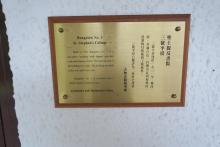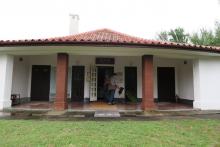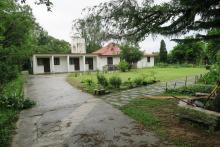Current condition
In use
Date completed
(Day & Month are approximate.)
Currently known as "Bungalow No.3", but when it was part of Stanley Internment Camp it was known as "Bungalow A".
Today the builiding houses the school's Heritage Centre, which contains many interesting items donated by internees and their families. You can visit the Heritage Centre as part of the guided tour of the school's heritage trail, see: http://www.ssc.edu.hk/ssctrail/eng/docent.html
An airplane dropped bombs or mines on this building on 25th July, 1945. Click here to can read about the incident in the diary entries for that day.



Comments
Photos from a visit last month
Here are a few photos from a visit last month.
The first photo shows the side view. Originally the flat-roof section on the left was the servants' quarters, and the section under the pitched roof on the right would be for a member of the school staff and their family. During internment there were no such divisions, and people lived wherever they could find a space.
Walking around to the front:
The veranda at the front of the bungalow:
And a plaque on the wall:
Bungalow A
During the Japanese Occupation, when this building was part of Stanley Internment Camp and being used to house internees, it was known as Bungalow A. It is now a Heritage Gallery on the St. Stephen’s College Campus.
The latest edition of the Journal of the Royal Asiatic Society, (no. 57, 2017), contains a very interesting article written by local historian Tony Banham which details the history of the bungalow. The article gives some interesting information regarding the 32 people who lived there during the Occupation.
One of those internees was Roland Stride, who lived in room number 1; the first on the right as you enter the building, with 4 other people. Roland was, pre-war, an assistant manager with Lane, Crawford. I took Roland’s son, Roger, plus the latter’s wife, to Stanley last year and it was very moving for him to see (for the 1st time) the place where his father had lived during those dark days of Occupation.